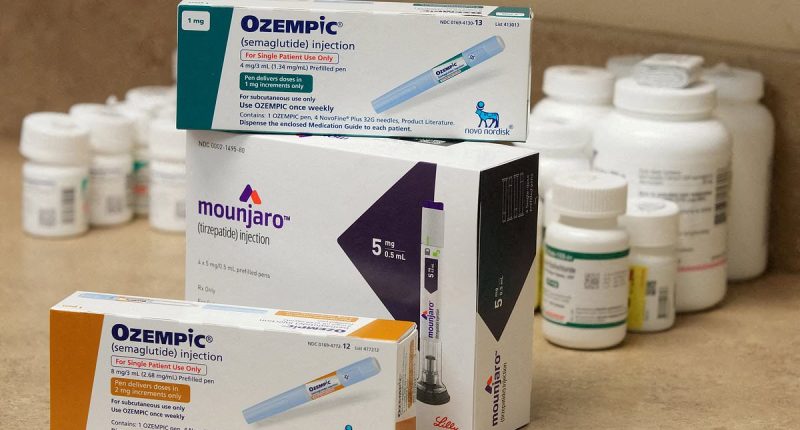Share this @internewscast.com
The trend for ‘microdosing’ weight-loss jabs comes with many dangers, doctors have warned.
More and more patients have started self-administering lower-than-recommended doses in an effort to avoid side effects while still shedding weight.
Once aimed at diabetes patients, Ozempic, Wegovy and Mounjaro are now famous for bringing about rapid weight-loss by reducing apetite.
But full doses often come with side effects, from nausea and constipation to the now-notorious sulphur burps. A growing number of people believe that microdosing will deliver the same results without the downsides.
The practice is also now being pushed online by self-styled ‘health gurus’ as a supposed fix for everything from blood pressure and brain fog to the ageing process.
The trend has been fuelled by high-profile figures in the ‘biohacking’ world who reportedly use the jabs not to lose weight, but as part of a broader longevity-boosting regime.
But experts say the practice is unregulated, unsafe and potentially deadly.
A spokesman for Novo Nordisk, which markets Ozempic and Wegovy, told MailOnline: ‘We do not condone these practices.
‘The approved doses are the only dose strengths that have been studied and are licensed for use.’
Speaking to the Mail, doctors warned that patients adjusting their own doses risk contaminating the drug or miscalculating the amount they inject.

Once aimed at diabetes patients, Ozempic, Wegovy and Mounjaro are now famous for fast weight loss – reducing appetite and helping users slim down rapidly
‘Patients contact us almost every week about this,’ said Dr Max Pemberton, NHS psychiatrist, Mail columnist and co-founder of weight loss service Slimmr.
‘But I’m very, very wary. It’s gone mainstream, it’s a trend – yet there’s no UK clinical guidance on this at all.
‘There are real risks. You could inject too much or too little. You could damage the drug in the process.
‘And worst of all, it might give people a false sense of security – that what they’re doing is safer, when it really isn’t.
‘Absolutely no reputable prescriber would endorse this behaviour or should. No prescriber should be recommending microdosing as a technique.
‘It makes me incredibly worried that people are taking their dosage into their own hands. They’re risking their health every time they do so.’
In the UK Ozempic, Mounjaro and similar drugs are supplied in pre-filled injector pens, with doses typically increased gradually under medical supervision.
With Mounjaro, for example, patients usually begin on a low starter dose of 2.5mg per week for the first month.
This is then doubled – and in some cases doubled again – until a long-term ‘maintenance’ dose of 5mg or 10mg weekly is reached.
These standard doses are the only ones backed by large-scale clinical trials. Any deviation is guesswork.
‘I get that there’s a desire for personalisation,’ said Dr Max Pemberton. ‘But a good prescriber will work out the right dose for a patient from the outset.
‘These are medications that should be used with respect to tackle obesity, which is a serious health condition. What a lot of these influencers, celebrities or social media health gurus have also not been honest about is that a lot of people who are microdosing are a healthy weight to begin with.’
He added: ‘For patients over a healthy weight, not taking a proper dose will ultimately be ineffective – research shows they will regain the weight.
‘We tell our patients, don’t think of the treatment as a sprint. It’s a marathon.
‘There may be a time in the future where people could be prescribed these drugs for cardiovascular benefits for instance, in lower doses than are currently prescribed for weight management, but that research is still emerging and we’re way off that.’

This map highlights the areas most blighted by obesity
Despite the concerns of doctors, jab users have been posting their personalised dosing schedules and sharing results on social media.
And even some healthcare professionals advocate the practice.
Anne Komé, a clinical pharmacist at the University of North Carolina, recently wrote in the journal Diabetes Care: ‘While unconventional, microdosing with semaglutide offers a tailored solution to provide therapeutic benefit, minimise adverse effects and address availability concerns.
‘Microdosing can be beneficial for patients who experience significant adverse gastro-intestinal effects, which are common with GLP-1 drugs.’
The lower costs involved with microdosing means that the practice may deter patients from buying cheap – and potentially dangerous – bootleg products online, she noted.
In a YouTube video this week, US-based plastic surgeon Dr Anthony Youn also told his five million subscribers he backed microdosing.
‘According to doctors, patients – especially women in peri- and post-menopause – benefit from microdosing that goes beyond just weight loss,’ he said.
‘By subtly improving insulin sensitivity and satiety, microdosing may help break the cycle of fatigue, cravings and brain fog that many women report.
‘But, they are not replacements for actual hormone replacement therapy (HRT).’
Nevertheless, some of the world’s most respected obesity researchers, who have many years of experience with weight-loss jabs, have come out against microdosing.
‘People are risking serious side effects from overdosing by doing this – as well as the potential to develop a life-threatening infection. It’s not a good idea,’ said Professor Alex Miras, an expert in endocrinology at Ulster University.
‘We know the pens can experience mechanical issues when people try to microdose – the devices can start to malfunction as they are not being used in the intended way.
‘If that occurs, there is no way of knowing if someone is taking the same dose or correct dose each time.
‘The pens also expire after six weeks. They’re sterile when dispensed, but once they’ve been used, they’re no longer sterile.
‘That means if people use a pen that’s expired, the leftover liquid in the pen could introduce harmful bacteria.’
But he added: ‘I completely understand why people do it.’
At least half a million NHS patients and some 15million patients in the US are now thought to be using weight-loss jabs, which can help patients lose up to 20 per cent of their body weight in just a few months.
And the numbers using them privately are even higher.
Yet around one in four adults in the UK are obese, giving the country one of the highest obesity rates in Europe. In the US, the figure stands at almost 75 per cent.
Another key question is whether microdosing any drug works only as a placebo.
In particular, research has suggested microdosing psychedelic drugs to treat mental health concerns has had a placebo effect.
For example, a 2021 study in the journal eLife, led by Dr Balázs Szigeti, a neuroscientist at Imperial College London, found that while people who illegally and informally microdosed themselves with LSD or psilocybin (‘magic mushrooms’) reported that they felt happier and more secure. So did people in the same experiment who microdosed with inactive placebo pills.
‘Microdosing is a failure of our NHS. The health service is still not widely offering these injections to everyone who would benefit,’ Professor Miras said.
‘People are taking it into their own hands to find solutions to the cost problem, if they are forced to go the private route.
‘This medication is expensive and we are effectively failing patients.
‘It can be tempting, especially if you’re paying for the drug privately. But don’t take the risk.’













